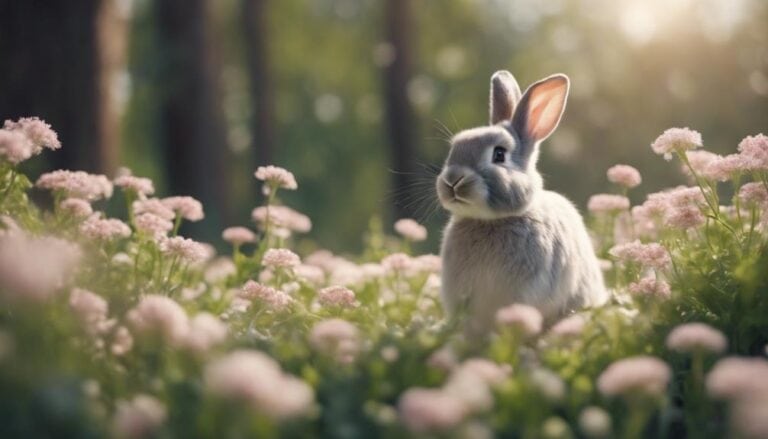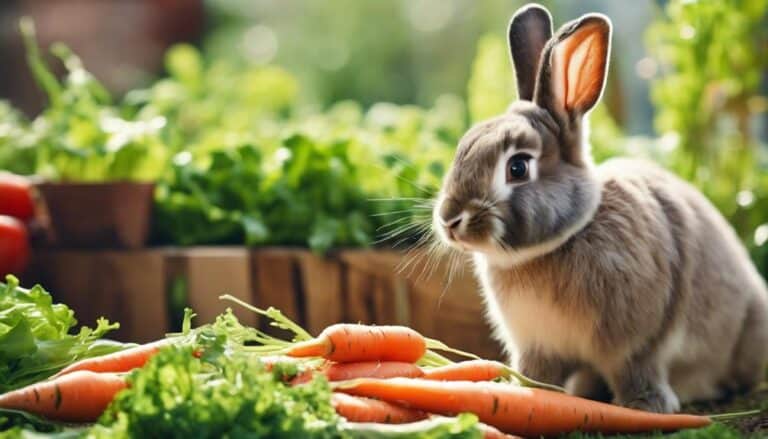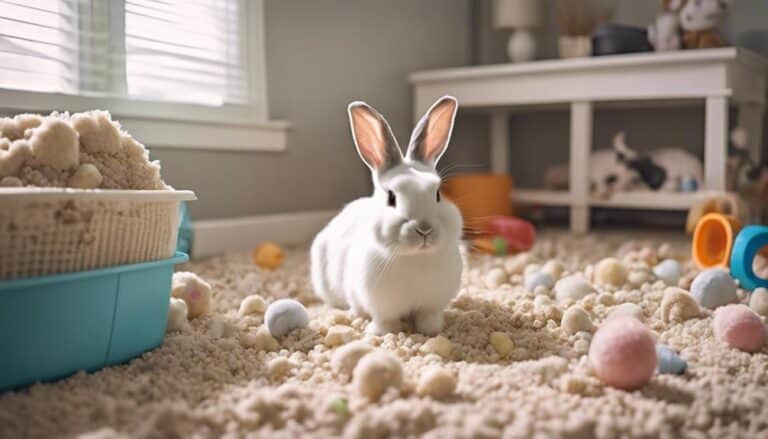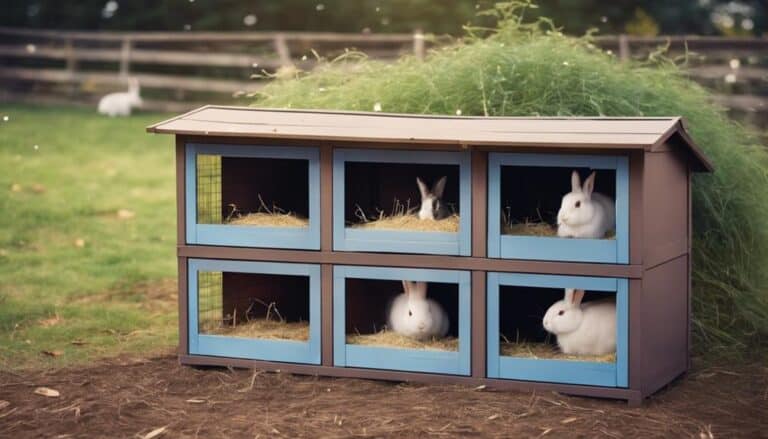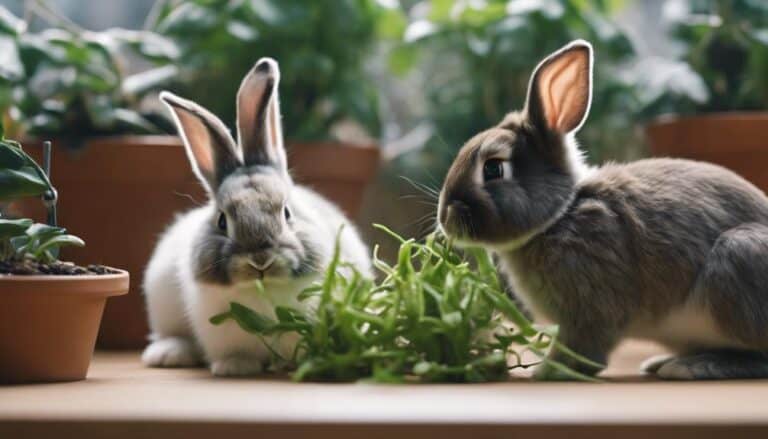Imagine a delicate ecosystem where each component plays an important role in maintaining balance. Just like in this system, the health of breeding bunnies is a cornerstone that affects the entire process.
Ensuring the well-being of your bunnies impacts not only their reproductive success but also influences their overall quality of life. From preventing hereditary diseases to promoting healthy pregnancies, the significance of health considerations in breeding bunnies extends far beyond the surface.
Understanding these important aspects is key to safeguarding the future of your bunny family.
Contents
- 1 Key Takeaways
- 2 Importance of Pre-Breeding Health Checks
- 3 Common Health Issues in Breeding Bunnies
- 4 Nutritional Requirements for Breeding Bunnies
- 5 Preventive Healthcare Measures for Breeding Bunnies
- 6 Genetic Considerations in Bunny Breeding
- 7 Understanding Reproductive Health in Bunnies
- 8 Managing Stress and Environmental Factors
- 9 Seeking Veterinary Support for Breeding Bunnies
- 10 Frequently Asked Questions
- 11 Conclusion
Key Takeaways
- Pre-breeding health checks ensure peak physical well-being and prevent passing on genetic defects.
- Proper nutrition and preventive healthcare support successful reproduction and offspring health.
- Understanding genetic history and addressing risks are essential for long-term breeding success.
- Veterinary support, stress management, and health monitoring are vital for breeding bunny welfare.
Importance of Pre-Breeding Health Checks
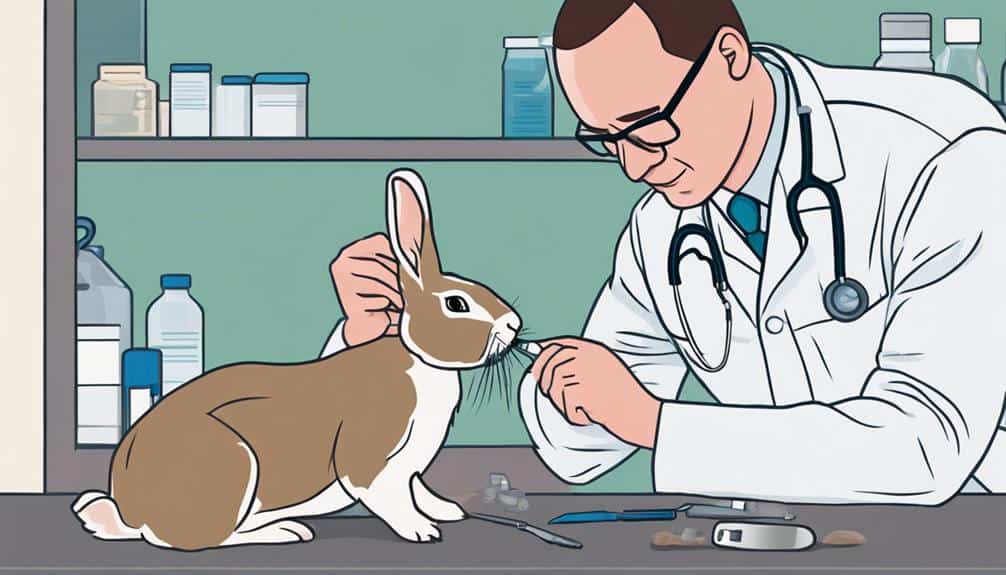
Prior to breeding your bunnies, conducting thorough pre-breeding health checks is imperative to guarantee their peak physical well-being and reproductive readiness. Breeding rabbits without proper health assessments can pose significant health risks to both the rabbits and their potential offspring.
By examining your bunnies for any genetic defects or hereditary conditions, you can prevent passing on harmful traits to the next generation. These checks also help identify any underlying health issues that could affect the breeding process, such as infections or parasites.
Ensuring your rabbits are in best health before breeding not only minimizes the risk of complications during the breeding process but also contributes to producing healthier offspring. Regular health assessments are essential for maintaining the overall well-being of your breeding rabbits and ensuring the continuation of strong, healthy genetic lines.
Common Health Issues in Breeding Bunnies
Before beginning the breeding process with your bunnies, it's important to be aware of the common health issues that can arise during this period. Here are some key health considerations to keep in mind:
- Pregnancy Complications: Breeding bunnies can lead to pregnancy complications such as dystocia (difficulty giving birth) and stillbirths, which can endanger the health of both the mother and offspring.
- Genetic Defects: Genetic defects like malocclusion (misalignment of teeth) and megacolon (enlarged colon) can be passed on to offspring through breeding, potentially leading to chronic health issues.
- Weakened Immune Systems: Breeding rabbits may have weakened immune systems, making them more susceptible to diseases and infections. Proper care and monitoring are essential to prevent health issues.
- Selective Breeding Concerns: Choosing aesthetics over health in selective breeding can result in rabbits with structural deformities and other health problems. Prioritizing health traits in breeding can help maintain the well-being of future generations.
Nutritional Requirements for Breeding Bunnies

To maintain the health and well-being of breeding bunnies, it's pivotal to provide them with a diet rich in protein, fiber, and essential nutrients.
Female bunnies, especially during pregnancy and lactation, require increased caloric intake to support their reproductive needs.
Offering a balanced mix of fresh hay, vegetables, and commercial rabbit pellets is key to meeting the nutritional requirements of breeding bunnies.
Essential Nutrients for Reproduction
Ensuring breeding bunnies receive a diet rich in essential nutrients like protein, fiber, vitamins, and minerals is important for supporting their reproductive health and success. To help you understand better, here are essential nutrients vital for your bunnies' reproduction:
- Protein: Supports muscle development and overall growth.
- Fiber: Aids in digestion and prevents digestive issues.
- Vitamins and Minerals: Essential for bone development and overall health.
- Water: Vital for hydration, digestion, and maintaining overall health during breeding.
Special Dietary Needs
Breeding bunnies thrive on a diet rich in fiber, fresh hay, vegetables, and limited pellets to fulfill their specific nutritional requirements. Pregnant and nursing rabbits have increased dietary needs, requiring extra calories, protein, and calcium to support healthy kit development. It's important to include calcium-rich foods like dark leafy greens and commercial rabbit pellets to prevent calcium deficiency.
Access to fresh, clean water is essential for hydration, especially during pregnancy and lactation. Monitoring the body condition and weight of breeding bunnies is crucial to guarantee they receive adequate nutrition for best health and successful reproduction. By meeting these dietary needs, you can support the well-being and reproductive success of your bunnies.
Preventive Healthcare Measures for Breeding Bunnies
Regular veterinary check-ups play an important role in identifying potential health issues early on for breeding bunnies. To guarantee the well-being of your breeding bunnies, consider the following preventive healthcare measures:
- Proper Nutrition: Providing a balanced diet rich in essential nutrients is essential for the health of breeding bunnies and their offspring.
- Hygiene: Maintaining clean living environments and grooming practices helps prevent the spread of diseases among the rabbit population.
- Vaccinations and Parasite Control: These measures are essential in safeguarding your breeding rabbits from illnesses and keeping them healthy.
- Monitoring for Signs of Stress, Illness, or Injury: Regularly observing your breeding bunnies for any unusual behavior or physical symptoms can aid in early detection and treatment of health issues.
Genetic Considerations in Bunny Breeding
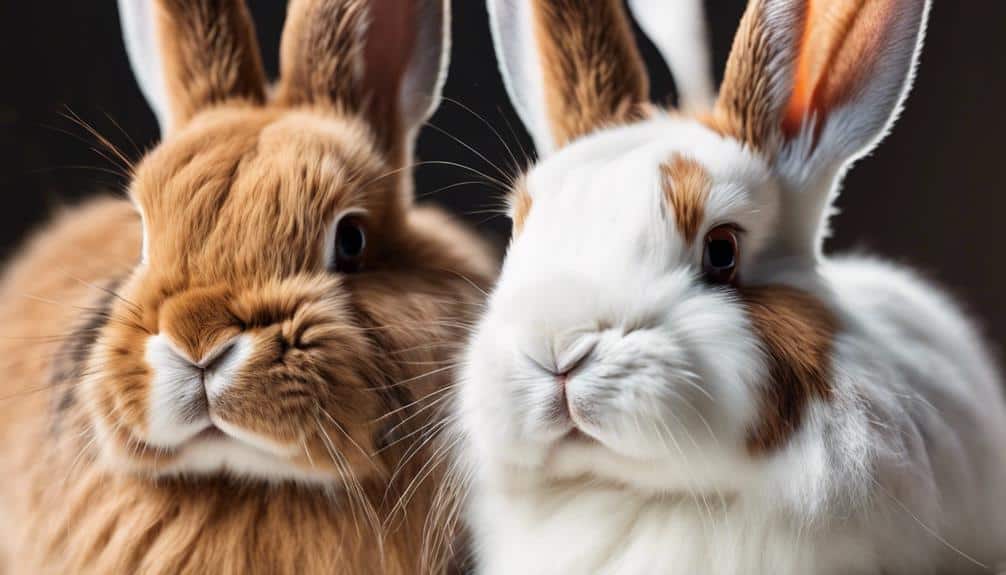
Moving from the focus on preventive healthcare measures for breeding bunnies, a critical aspect to contemplate in ensuring the long-term health and quality of offspring is understanding the genetic considerations in bunny breeding.
Recognized breed colors aren't just for aesthetics but also guide breeding decisions, ensuring adherence to breed standards and preventing undesirable traits. Delving into the genetic history of rabbits is essential as it helps predict which traits will be passed down to future generations.
Health history is equally important, impacting the well-being of breeding rabbits and their offspring. Poor conformation in rabbits can result in physical deformities and health issues in the young, emphasizing the importance of selecting breeding stock with sound genetic traits.
Understanding Reproductive Health in Bunnies
Understanding the nuances of reproductive health in bunnies is essential for ensuring the well-being and longevity of both the breeding rabbits and their offspring. When it comes to breeders, genetic defects, and reproductive health in bunnies, here are some important points to keep in mind:
- Pregnancy Risks: Reproductive health in bunnies includes risks of pregnancy complications and delivery issues that can impact both the mother and the offspring.
- Common Health Concerns: Weakened immune systems, malnutrition, and dental problems are common health concerns in breeding rabbits that can affect their reproductive health.
- Selective Breeding Impact: Selective breeding for aesthetics over welfare can lead to significant suffering and gastrointestinal issues in rabbits, emphasizing the importance of responsible breeding practices.
- Genetic Defects: Genetic defects resulting from breeding practices can lead to physical deformities and various health problems in bunnies, highlighting the necessity of understanding and addressing genetic risks in breeding programs.
Managing Stress and Environmental Factors

To guarantee successful bunny breeding, it's important to address stress factors that may impact fertility and overall health. Environmental considerations such as temperature, humidity, and noise levels play a significant role in breeding outcomes.
Stress in Breeding
Managing stress in breeding bunnies is paramount for guaranteeing their health and reproductive success, with environmental factors playing a pivotal role in influencing their overall well-being. Here are four essential tips to help you manage stress in breeding bunnies effectively:
- Provide a Calm Environment: Create a tranquil space free from loud noises and sudden disturbances.
- Maintain Best Temperature: Guarantee the breeding area is neither too hot nor too cold for the bunnies.
- Handle Bunnies Gently: Minimize stress by handling the bunnies with care and avoiding rough movements.
- Offer Comfortable Living Conditions: Provide cozy bedding, sufficient space, and a balanced diet to promote their well-being.
Environmental Impact
Ensuring a peaceful and stress-free environment is essential for optimizing breeding outcomes and promoting the well-being of bunnies. When it comes to breeding bunnies, environmental factors like temperature, ventilation, and cleanliness play a crucial role in their overall health and reproductive success.
Providing a calm and safe space for your bunnies can greatly reduce their stress levels, leading to more successful breeding outcomes. Factors such as proper nutrition, adequate space, and good hygiene practices also contribute to maintaining the best health during the breeding process.
Health Monitoring Practices
Maintaining the well-being of your breeding bunnies requires close attention to their stress levels and the environmental factors that can impact their health and reproductive success. Here are some essential health monitoring practices to guarantee the best care for your bunnies:
- Regular Health Checks: Schedule routine check-ups to catch any health issues early.
- Environmental Control: Monitor temperature, humidity, and cleanliness to provide a suitable living environment.
- Stress Reduction: Create a calm and stable atmosphere to minimize stress and promote well-being.
- Observational Skills: Pay attention to subtle changes in behavior or appetite that could indicate underlying health concerns.
Seeking Veterinary Support for Breeding Bunnies
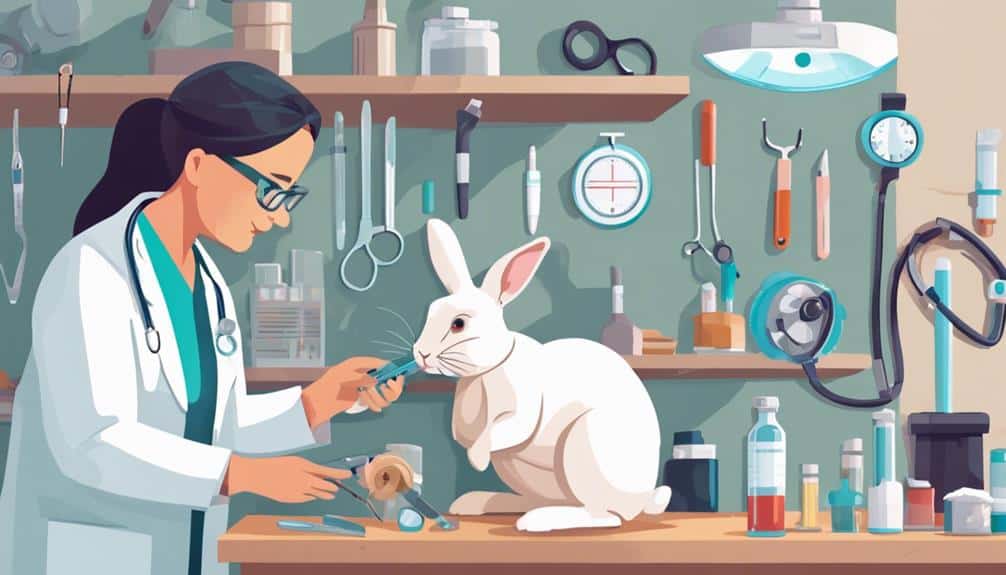
Seeking veterinary support for breeding bunnies is essential for ensuring the health and well-being of both the breeding rabbits and their offspring. Regular check-ups with a veterinarian play a vital role in monitoring the health of breeding rabbits throughout the breeding process. Veterinarians offer valuable guidance on nutrition, breeding practices, and overall health management to enhance the chances of successful breeding outcomes.
By collaborating with a veterinarian, potential health issues can be detected early on, allowing for timely intervention and treatment. Ensuring that breeding rabbits are in vital health is essential for successful reproduction and the well-being of the offspring. Access to veterinary care is a cornerstone of responsible breeding practices, safeguarding the health of both the breeding rabbits and their future litters.
Veterinary support not only contributes to successful breeding but also promotes the overall welfare of the rabbits involved in the breeding process.
Frequently Asked Questions
What Are the Considerations for a Pet Rabbit?
To keep your pet rabbit healthy, prioritize their dietary needs with hay and veggies, provide ample exercise space, groom them regularly, offer social interaction, schedule vet check-ups, and guarantee a spacious cage. These considerations are crucial for your bunny's well-being.
What Are Important Conditions Needed to Raise Rabbits?
To raise rabbits successfully, you need to provide proper shelter, meet their dietary needs, maintain health care, follow grooming tips, establish exercise routines, and employ socialization techniques. These elements are essential for happy, healthy bunnies.
What Is the Importance of Breeding Rabbits?
Breeding rabbits is essential for maintaining genetic diversity, ensuring reproductive health, and managing populations. By prioritizing health considerations, you can preserve desirable traits, prevent genetic disorders, and promote the overall well-being of these precious animals.
What Are the Important Factors of Rabbit Production?
When it comes to rabbit production, important factors include implementing proper breeding practices, meeting their specific nutritional requirements, and ensuring ideal reproductive health. These elements are crucial for successful and sustainable rabbit farming.
Conclusion
To guarantee that health considerations are key for breeding bunnies. By prioritizing pre-breeding health checks, addressing common health issues, meeting nutritional requirements, and implementing preventive healthcare measures, you can safeguard the well-being of both mother and offspring.
Genetic considerations, reproductive health, stress management, and veterinary support are all crucial aspects to think about. Make sure to maintain a mindful and meticulous approach to breeding bunnies to promote their overall health and happiness.

